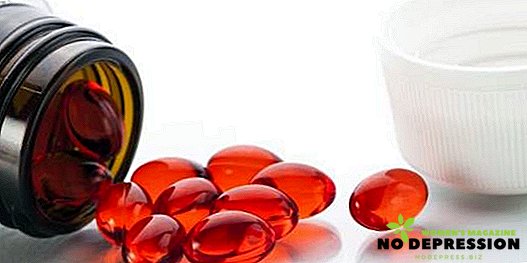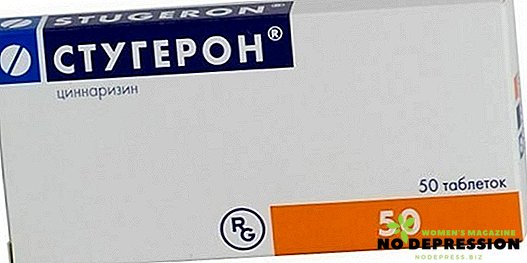The diet of a modern person excludes sufficient obtaining the necessary substances by the body from food, and the rhythm of life and stress interfere with the replenishment of their own. Most of the people are deficient in certain substances and vitamin deficiency, and therefore have to resort to using them as additives and vitamin complexes.

Vitamin A is responsible for the overall condition of the body. With its lack of metabolic processes are disturbed, a decrease in growth in children and adolescents is noticed. Immunity and eyesight is reduced, including its deficiency badly affects the cornea and the lacrimal glands.
Adults who receive insufficient amounts of vitamin A suffer from so-called "night blindness" - a disease in which the eyes do not distinguish anything at dusk. That is why it is important with a deficiency of this vitamin in addition to take it in food.
Daily need for vitamin a
The consumption of the necessary amount of vitamin A is important, as it participates in serious processes of the body, such as metabolism, the immune system, without which building protection against viruses and infections is impossible, and also contributes to the successful work of the visual apparatus.
It is important to know that this vitamin is insoluble in water, however, it is fat soluble, and is absorbed only in combination with animal fat. Therefore, it comes in the form of an oil solution, or gelatinous dragees, filled with butter.
 You can also often see the drug "Aevit", which contains two fat-soluble substances: retinol and tocopherol. Food sources of vitamin A are the following foods:
You can also often see the drug "Aevit", which contains two fat-soluble substances: retinol and tocopherol. Food sources of vitamin A are the following foods:
- Fatty dairy products such as butter, cottage cheese, cream;
- Liver of marine fish - halibut, perch, cod and others, as well as some mammals;
- Carrots, which are rich in carotene and promote the intestinal reproduction of the vitamin; applying it and other vegetables in order to obtain carotene, it is required to use it with fatty foods. As a rule, most of the yellow and orange vegetables and fruits, to one degree or another, contain carotene, which is involved in the production of vitamin A by the body.
In animal fats, the amount of vitamin A depends on whether the fish, poultry, or mammal ate. If the diet has a rich and varied plant food, there is a high probability of a high content of vitamin in its liver, like in fish, or in milk, like in mammals.
 Fish oil is more saturated with retinol (vitamin A), tens or hundreds of times stronger than cow's milk-based products, since their nutrition contains more of a given substance, which they receive from plankton and algae. In such a situation, it is rather difficult to obtain the required amount of vitamins from food, especially for the residents of the middle lane and distant regions from the sea.
Fish oil is more saturated with retinol (vitamin A), tens or hundreds of times stronger than cow's milk-based products, since their nutrition contains more of a given substance, which they receive from plankton and algae. In such a situation, it is rather difficult to obtain the required amount of vitamins from food, especially for the residents of the middle lane and distant regions from the sea.
The normal daily intake for adults is between 1 and 2.5 mg or 3300 IU (international units), which is equivalent to 5 mg of α-carotene. In women during pregnancy and lactation, these figures are 2 times higher, because vitamins are important for the development of the fetus, and are also passed to the baby with milk.
Also, the amount of vitamin A produced should be greater for people who are constantly straining their eyes — pilots, drivers, computer workers, seamstresses, and many others.
Indications and contraindications for use
There are a number of indications for taking vitamin A, including not only vitamin deficiency, but also many stomach diseases, intestines, nervous disorders, reduced immunity, eye diseases, nervous disorders, general fatigue, skin problems and much more.
Here are some examples when vitamin supplementation is recommended:
- with diarrhea and infectious diseases, reduced immunity and frequent colds, weakness of the body;
- with gastrectomy, steatorrhea, celiac disease, sprue, Crohn's disease and cystic fibrosis of the pancreas;
- with severe weight loss and poor diet and nutrition;
- during pregnancy and lactation to assist in the development of the child;
- with nervous disorders, severe and prolonged stress, fatigue and loss of strength and sleep, various addictions from nicotine, alcohol or drugs;
- while taking certain medications that worsen the condition of the gastrointestinal tract or adversely affect eyesight;
- with hemeralogy, xerophthalmia, keratomalacia and general impairment of vision and other eye diseases;
Contraindications to the intake of this vitamin are mainly from the kidneys and liver: cirrhosis, renal and hepatic insufficiency, viral hepatitis. Also, when hypervitaminosis and hypersensitivity to drink vitamin A is impossible.
How to take vitamin A capsules: instructions
Vitamin intake is made both for the prevention of diseases and beriberi, and in addition to treatment. In this regard, the single dosage may vary. Since vitamin A is fat soluble, it is administered orally after a meal, for better absorption.
Depending on the content of the vitamin in the capsule, on the age and indications for use, they take 1-5 capsules 2-3 times a day 15 minutes after eating. For prophylaxis, usually 1-2 tablets are drunk, the prescribing physician prescribes the therapeutic dosage and the duration of the course. Independently take a large amount of retinol without a doctor's evidence is impossible.
The subtleties of vitamin A
 As mentioned above, this vitamin must be drunk after a meal, because this way it is better absorbed and begins to affect. In addition, it is important to take care of the proper storage of capsules or oil solution, which must be kept in a cool place to avoid oxidation, and also it is important to eliminate the chance of sunlight that destroys the structure of vitamins.
As mentioned above, this vitamin must be drunk after a meal, because this way it is better absorbed and begins to affect. In addition, it is important to take care of the proper storage of capsules or oil solution, which must be kept in a cool place to avoid oxidation, and also it is important to eliminate the chance of sunlight that destroys the structure of vitamins.
Take pills or solution must be strictly in accordance with the instructions or medical prescription, as this is serious and possible overdose. If you are contraindicated for use or hypervitaminosis, you should not drink vitamin A.
Side Effects and Overdose
An overdose of vitamin A is not very common, however, it is quite unpleasant and dangerous. For the first time, such a phenomenon was observed in the inhabitants of the north in the 20th century, as they ate the liver of the animal in which the substance was contained in excess. Physically, hypervitaminosis is manifested in the following symptoms:
- tired state, which occurs rather quickly, a feeling of general malaise, weakness, loss of appetite, nervosa, headaches, increased pressure;
- thirst and dry mouth, itching and irritation, deterioration of nails and hair, accompanied by their fragility and loss;
- pain in the eyes, disorders and pains of the stomach and intestines;

- failures and changes in the menstrual cycle in women, common hormonal disruptions are also possible;
- children have nerve conditions, hyperactivity, worsening of sleep, attention, which, in the background of decreased appetite, leads to a sharp weight loss, slower growth and development, as well as an increase in the liver;
- in pregnant women and nursing mothers, hypervitaminosis is not allowed, since it causes great harm to the child, therefore, when the first symptoms occur, it is necessary to immediately consult a doctor.
With an overdose, you must take vitamin D, which reduces the amount of vitamin A in the body.
To wash with abundant drinking too large a dose of the drug will not work, as it is not water soluble.
Interaction with other drugs
Vitamin A has good compatibility with most drugs and does not cause any special effects on their work, however there are some categories of drugs with which its administration is not desirable and harmful:
- many drugs have a depressant effect on the liver, such as hepatoxic drugs: flucostat, amidoran, and many others; taking vitamin A will exacerbate the damaging effects on the body, therefore, retinol should be put aside for the time of treatment with such drugs;
- antibiotics have a lot of contraindications, including, they are not combined with vitamin A;
- retinol reduces the effects of drugs that improve blood clotting, removing their effect, so you cannot drink it during treatment; hemophilia is also contraindicated.

Vitamin A Capsule Preparations: An Overview
There are not too many preparations with capsules containing liquid vitamin A. There are several Russian pharmacological companies that produce inexpensive pills in convenient blisters of 10 capsules, as well as foreign supplements with a high content of retinol:
- capsules of retinol acetate "Lumi" - the most common red pills in a gelatinous shell with an oil core, each capsule contains 1.5 milligrams of the active substance dissolved in vegetable oil with a faint odor; the cost of a blister of 10 tablets is in the range of 6-10 rubles;
- Retinol acetate "Marbiopharm" - in addition to the usual oil solution, the company produces capsules with a retinol content of 33,000 IU each; the package contains 30 round light yellow dragees in a gelatinous shell, inside which there is sunflower oil and vitamin; packaging is designed for a monthly course; the price of the box is about 30 rubles;
- bioadditive from the American company "Now Foods" has a cost of about 254 rubles, which is justified by the high content in each capsule of retinol, namely, 3 milligrams, in a package of 100 capsules.
Be healthy!
Also about the benefits of vitamin A can be found in the following video.













